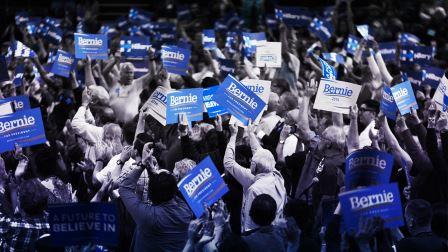The Scientific Reason Why Sanders Supporters Are So Angry
Last week, Paul Simon played a concert here in Austin. Early in the show, he ran through his classic tune “Slip Slidin’ Away,” with the wonderful chorus, “You know the nearer your destination, the more you’re slip slidin’ away.”
A few days later in Las Vegas, some 1,200 miles away, the Democratic Party of Nevada held its state convention. I was thinking of those Paul Simon lyrics while reading about what transpired there, with a group of Bernie Sanders supporters reportedly harassing a party official and throwing chairs in protest.
The event, the past week’s fallout from it, and the final phases of the Democratic primaries in general together make for a case study in the psychology of anger.
Coming Close
It’s important to point out that many Sanders supporters (like many Trump supporters) are motivated by anger—and not just at Sanders’s stump-speech targets, like big banks and powerful lobbying groups. They’re angry that the needs of the poor and middle class are talked about but not sufficiently addressed by the political system. And they’re also angry that their views aren’t reflected as compellingly by other, more mainstream candidates, particularly Hillary Clinton.
At both extremes of the American political spectrum, this frustration with establishment leaders has caused voters to flock to outsider candidates, including Donald Trump, in large numbers.
But it’s only recently that that anger seems to have hit a boiling point on the left; Sanders’s supporters’ frustrations were largely at a simmer until very recently. It came out in social media posts and the comments sections of news stories. Ever since Hillary Clinton took a significant lead in the delegate count in the Democratic primaries, especially after her victory in New York, this anger has been increasingly directed at the Clinton campaign and her supporters.
And the reason why that shouldn’t surprise anyone is precisely because Sanders has gotten so close to his goal of being the nominee.
Emotions And Goals
Emotions reflect the energy in what psychologists, like myself, term the “motivational system,” which involves regions deep in the brain that don’t often communicate well with the wonderful storytelling apparatus we’ve developed in our brain’s cortex. Partly as a result of that imperfect dynamic, our motivational engagement in a situation is largely determined by the emotions we experience from it.
The more deeply engaged we are in trying to achieve a goal, the more psychological energy, or “arousal,” is built up around the goal—and that arousal is reflected in the strength of our emotions. When a goal we want to achieve is blocked by forces we see as outside of our control, we experience frustration and anger.
But a key feature of arousal is that it increases the closer you get to your goal.
If Sanders had been trounced in every primary starting in January, his supporters would’ve been disappointed, but it would be hard for them to envision a world in which he could actually secure the Democratic nomination.
Instead, Sanders has won a number of primaries and caucuses. He’s strung together streaks of victories. And while Obama’s lead over Clinton was considerably narrower in 2008 than Clinton’s is over Sanders’s today (a point that Clinton late last week wasted no time making), Sanders continues to lead Clinton in polls positing head-to-head match-ups against Trump.
As a result of all this, it becomes easier for Sanders backers to imagine that if the world were only slightly different from the way it is, Sanders might actually be ahead in the delegate count or even the popular vote. The nearer your get to your destination, the more aroused, psychologically speaking, you are to get there.
How Obstacles Turn Arousal Into Anger
So why has this boiled over into the sort of anger we saw last week?
Hillary Clinton is the obstacle that stands between Sanders and the nomination. And that creates a tension that turns arousal into anger—the same psychological energy behind the goal is channeled into a different type of emotion. Sanders’s supporters see him as an outsider candidate, and his campaign’s rhetoric and much of the coverage surrounding his performance have focused on party rules (like the presence of super-delegates) that many believe stack the system in favor of establishment candidates.
As a result, it seems to many as though Sanders is being kept away from the nomination by forces outside of the campaign’s control. The feeling is that no matter what Sanders does, no matter how many primaries he wins, he still won’t get be granted the nomination.
And that is the best recipe there is for anger: arousal, blockage of a goal, and the presence of outside forces causing that blockage. Small wonder that in the waning days of the primary season, the campaigns have gotten nastier.
The unfortunate part about anger is that the arousal to act often overwhelms more thoughtful and less emotional responses. People say and do things in anger that are hard to walk back later. If Clinton becomes the Democratic Party’s nominee, it will be interesting to see whether Sanders supporters can get beyond the emotions building up in recent weeks in order to unify around her campaign.
related video: When Rhetoric borders hate: Should Facebook Censor Donald Trump?
Fast Company , Read Full Story
(21)













